Shakespeare for young kids
I've been introducing Wanda to Shakespeare over the last few years, and we recently leveled up to the real deal: Shakespeare's actual words.
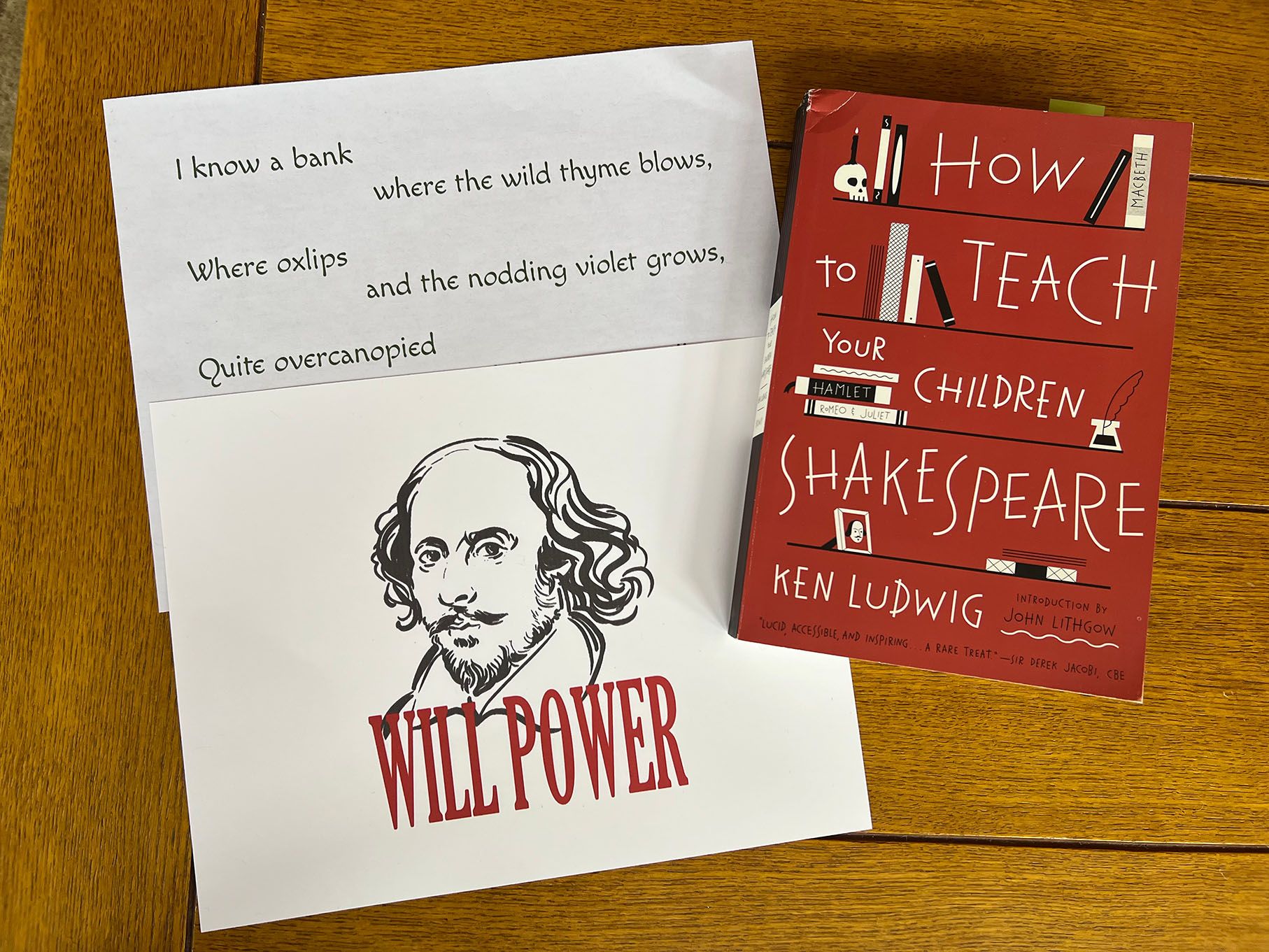
From early in our homeschooling, I felt that it would be worth taking some time to introduce Wanda to Shakespeare. His stories continue to echo in the stories we tell today, with even baby books making references to his most famous tales. His depictions of history continue to shape how we imagine the actual events—when we think of the murder of Julius Caesar, we think of Shakespeare's "et tu, Brute?" So many of Shakespeare's unique uses of language have entered our common speech that we don't realize we're using words we got from him.
I felt a foundation in some of the basics of Shakespeare would be important for building broader comprehension of our cultural world.
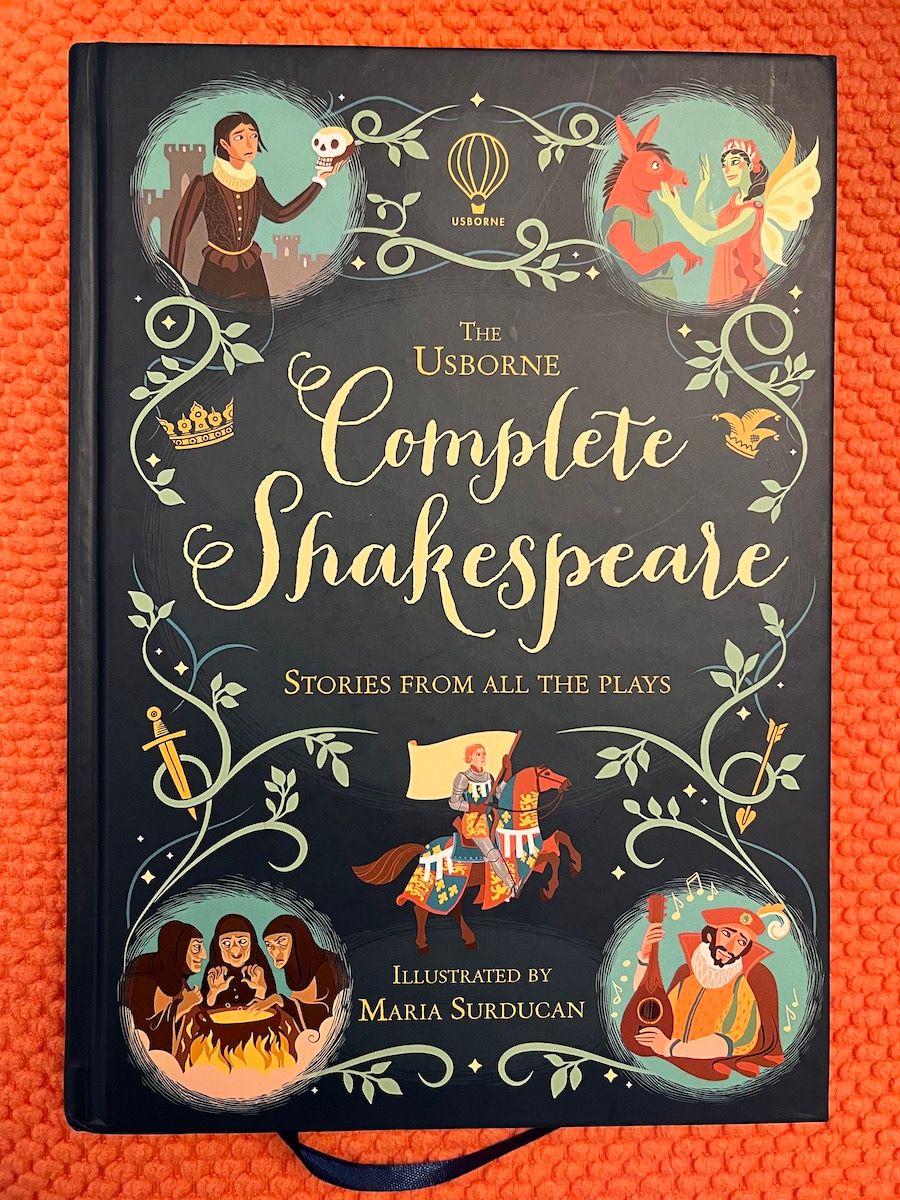
The Usborne Complete Shakespeare
I started with a book that has turned out to be one of my better purchases: The Usborne Complete Shakespeare. This beautiful and beefy book holds summaries of all of Shakespeare's plays, each in the form of a kid-friendly short story. I bought it when Wanda was just starting 2nd grade. I wasn't sure she would be quite ready for it, but I was pleasantly surprised when she dove into the book on her own. She was particularly drawn to the illustrations by Maria Surducan that kick off each story, introducing the characters. She loved the way Surducan used colors to set the mood of each story.
Once she came up from the book for air, she was fired up, and eager to share her impressions. "THIS GUY knows how to write a STORY!" She liked the comedies more than the tragedies—no surprise there—but she enjoyed it all.
Knowing these stories has helped Wanda pick up on references over and over again, enhancing her reading comprehension. Even now, a couple years on, she reaches for her Complete Shakespeare book regularly, usually when we come across a reference, or when she sees a parallel to a Shakespearean character, or when she detects an echo of a Shakespeare story. I highly recommend this book as an ideal starting point for Shakespeare.
Table Top Shakespeare
Wanda's interest in Shakespeare happened to occur at the same time that an inventive theater troupe in the UK, Forced Entertainment, was sharing their "Table Top Shakespeare at Home" performances online. Each one features an actor relating the plot of a Shakespeare play, using common household items as the "actors." They are funny, engaging, and best of all, very easy to follow and understand. Forced Entertainment now has every one of Shakespeare's plays viewable on their website. Three cheers for Forced Entertainment for sharing their wonderful performances in such an accessible format!

Will's Words
Shakespeare's stories are a big part of his appeal, but I also wanted Wanda to understand how strong his power was with language.
I started with the children's picture book Will's Words, by Jane Sutcliffe, with illustrations by John Shelley. It provides a look at the world of William Shakespeare in late 1500s England, including what it was like to perform in or see one of his plays at the Globe Theater. The text of the book makes heavy use of the many, many words and turns of phrase that we still use today thanks to Shakespeare's inventive voice. The Guardian has a thorough look through the pictures in the book, with notes from the author and illustrator about creating the book.
Otherwords
PBS has some truly fantastic educational content available on YouTube. They have a new-ish series that gets enchantingly dorky about language, called Otherwords, hosted by Dr. Erica Brozovsky. I recommend the entire series, but the one about words invented by authors has a big focus on Shakespeare, naturally.
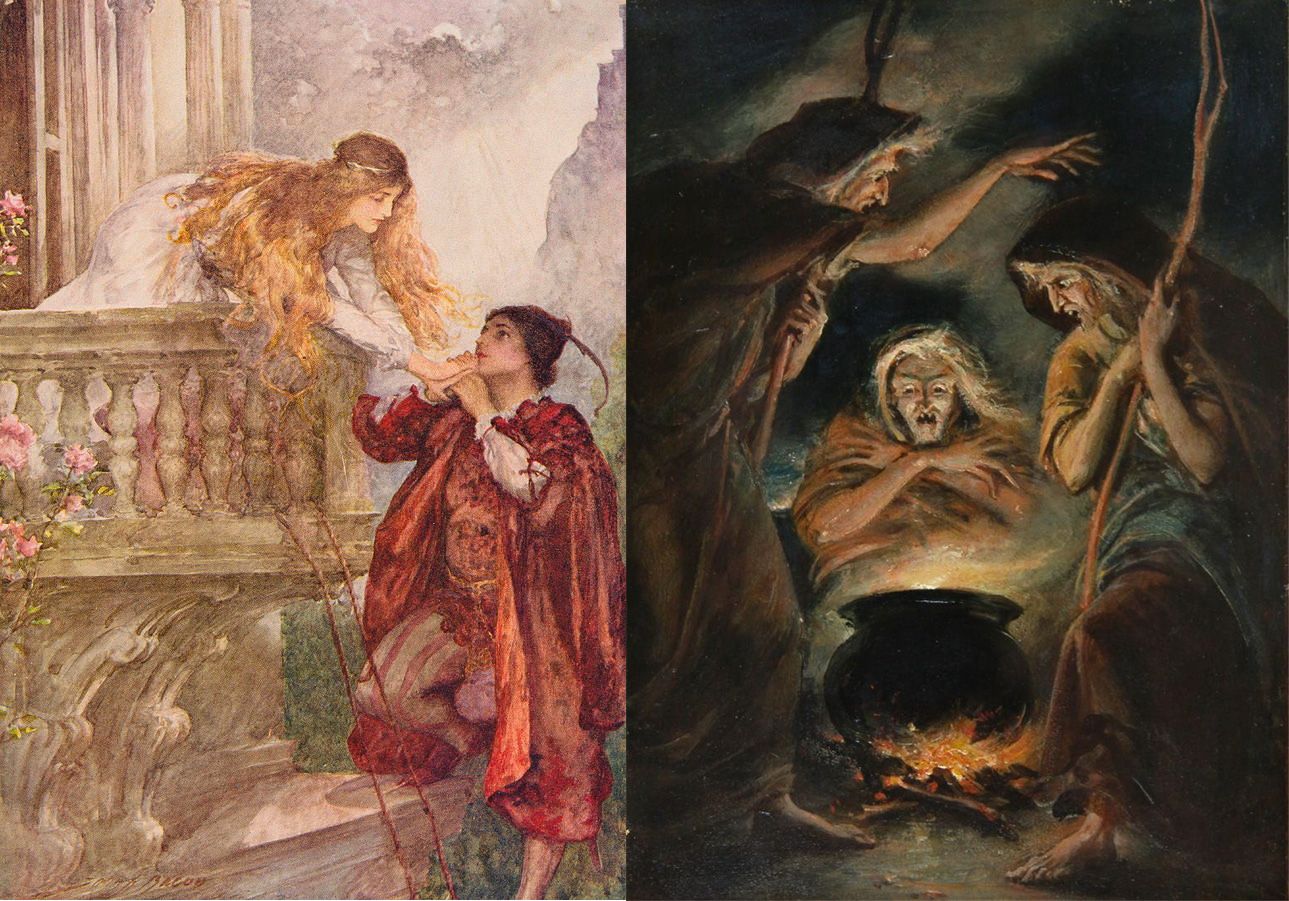
Michael Clay Thompson Poetry
Our main language arts curriculum, Michael Clay Thompson, includes books on poetics. These books were Wanda's first true introduction to the beauty, art, and intention of Shakespeare's word choices.
In particular, Wanda was wowed by a lesson that highlighted Shakespeare's use of iambic meter to add a lilting quality to the swooning, romantic language of Romeo & Juliet, and contrasted that against his use of trochaic meter in the witches' scene of Macbeth to create a feeling of tension and discomfort.
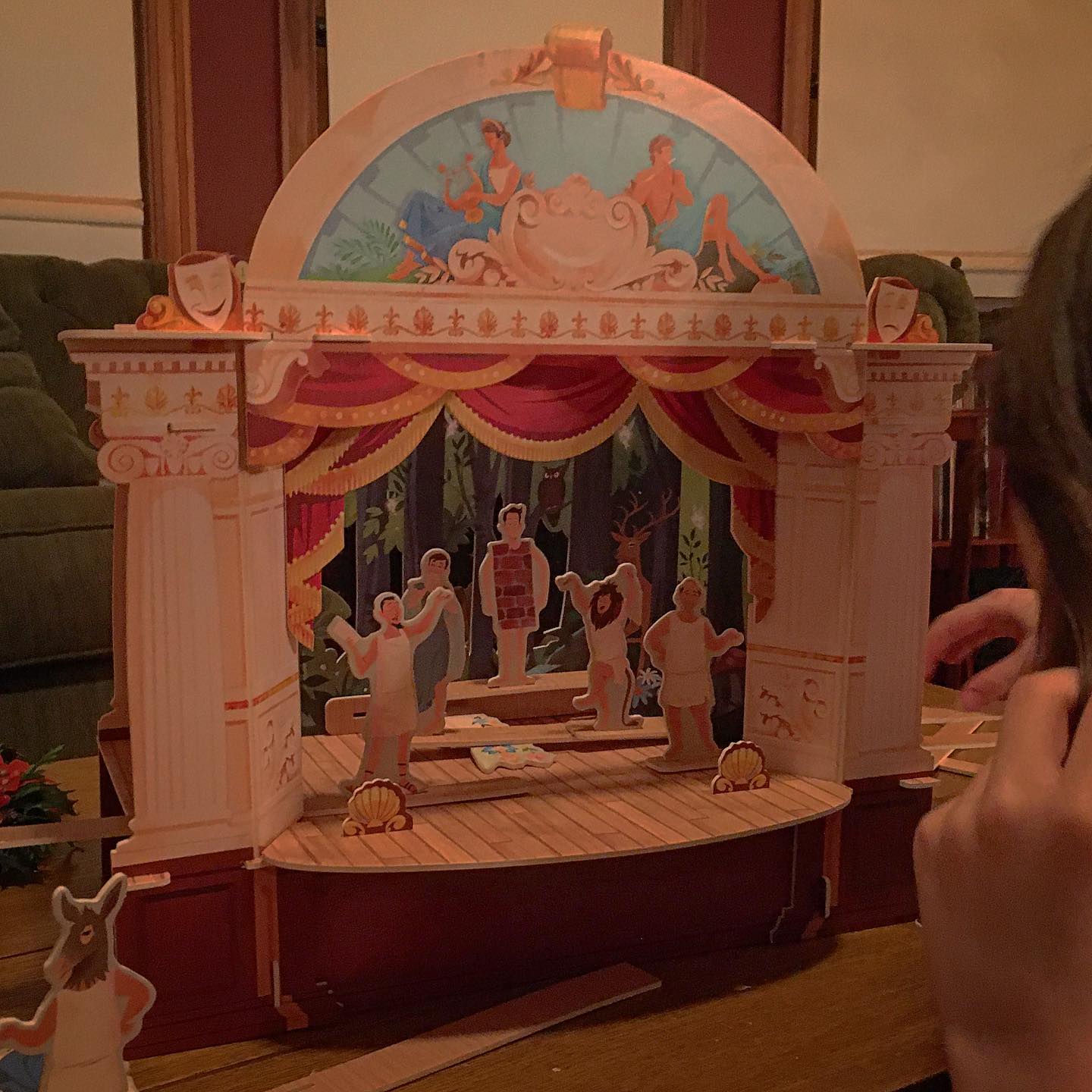
Usborne's Slot-together Theater
For a bit of fun, I got Wanda Usborne's Slot-together Theater. Man, I would have loved this thing when I was a little girl. It's made of lightweight foam board pieces, with sets and characters to stage two plays: A Midsummer Night's Dream, and The Nutcracker. It comes with (simplified) stageplays for both, and even includes QR codes to play music for each production.
Wanda most recently used the theater to stage a few scenes from A Midsummer Night's Dream using her Homestar Runner figurines. Strong Bad was Oberon, The Cheat was Puck, Marzipan was Titania, Coach Z was Bottom, and Strong Sad was Peter Quince.

Bill
A bit of just-for-fun Shakespeare was the feature film Bill from 2015. It's a silly what-if movie about William Shakespeare, from the folks behind the BBC educational series Horrible Histories and the BBC sitcom Ghosts. We LOVE those guys, but I'll be honest: I pretty much don't remember Bill at all. (But if you haven't watched BBC's Ghosts, you must, we love it.)
Kiss Me Kate
I adore this classic musical, but when I watch it my heart is throbbing for Cole Porter and Ann Miller more than Shakespeare. And that gorgeous 1953 color pallette! All the same, it's a must-see if only for the famous "Brush Up Your Shakespeare" song and dance. Wanda enjoyed this film.
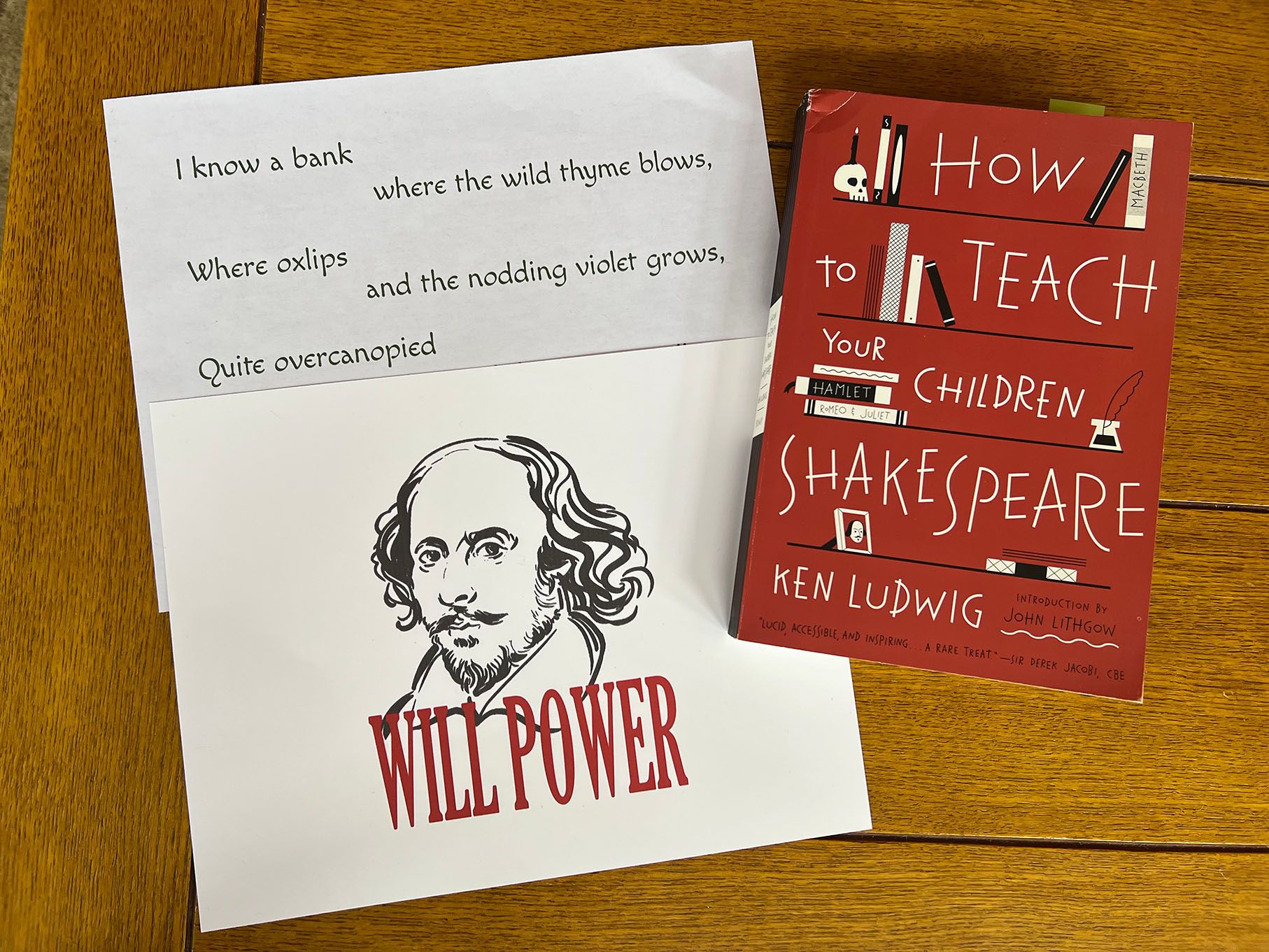
How to Teach Your Children Shakespeare
Our latest step in learning about Shakespeare is a big one, and I'm thrilled with how it's going so far. How to Teach Your Children Shakespeare is by Ken Ludwig, a Broadway and East End playwright and theater director. When writing the book, he drew on his experiences teaching his own children Shakespeare.
This book introduces kids to the real deal: William Shakespeare's actual, original text, in play script form. I bought the book a while back, but have been saving it for when I felt Wanda was ready. Now that she's starting 4th grade, the time felt right.
We started a couple weeks ago, with a speech Oberon gives in Act 2 of A Midsummer Night's Dream. In this speech, Oberon, king of the fairies, describes the river bank where Titania, queen of the fairies, sometimes sleeps, and declares his intention to pull a prank on her in their escalating war: enchanting her to fall in love with the first thing she sees when she awakes.
The superficial end goal is for Wanda to memorize this speech, but that's just the tip of the iceberg. In order to truly know this speech, she has to understand it.
I know a bank where the wild thyme blows,
Where oxlips and the nodding violet grows,
Quite over-canopied with luscious woodbine,
With sweet musk-roses and with eglantine.
There sleeps Titania sometime of the night,
Lulled in these flowers with dances and delight.
And there the snake throws her enamelled skin,
Weed wide enough to wrap a fairy in.
And with the juice of this I’ll streak her eyes,
And make her full of hateful fantasies.
In the course of learning this one little speech, we've talked about why Shakespeare wrote it the way he did:
- The rhythm makes it pleasant to the ear, but it also makes it easier for the actor to memorize.
- A couple of tongue-twistery syllable juxtapositions in the speech ensure that the actor's delivery is appropriately slowed down—a verbal speed bump, of sorts.
- By listing a variety of delicate flowers, it literally helps to set the scene—no CGI in Shakespeare's world. I pulled up pictures of each flower for her to see.
- He mentions "nodding violets," words that create the visual of not just the flower, but of sleepiness, and of deference shown to a fairy queen. Two little words convey so much!
- The English of Shakespeare's time held meaning sometimes lost today, so we need to become reacquainted with these definitions to understand his script: "blows" means blooms, "weed" is referring to material for clothing.
- The speech starts off describing a delightful, pastoral scene, and paints a picture of a place where Titania feels very safe and comfortable... making the contrast sharp when Oberon declares his intention to choose that place to play a trick on her. Oberon is not a good partner and has some things to learn about consent!
- Earlier in the play, Oberon has gone into some detail about this plan for "hateful fantasies"—to enchant Titania with a magic flower (that flower is the "this" towards the end of this speech), to make her fall in love with something strange and unwelcome—so I read and explained that earlier speech to her.
- In this scene, Oberon is ostensibly talking to Puck, but I demonstrated for her that the actor playing Oberon wouldn't face Puck directly to deliver this speech—because the actual audience for the speech is, well, the audience! So the two actors would perhaps do something more like a 3/4 turn towards each other, almost as if the audience is a third participant in the conversation, or perhaps Puck would look on as Oberon delivered his speech to the world, in a King-of-the-Fairies kind of way.
- Shakespeare now has the audience on the edge of their seats: what is going to happen when Titania awakes??
Wanda is already well acquainted with A Midsummer Night's Dream, so she knows about the plot, the intersecting storylines, the characters, their motivation, etc. All of that foundation work from earlier years: the Usborne book, the Table Top Shakespeare performance, the Slot-together Theater, all of that set her up to be ready for success in understanding, memorizing, and best of all appreciating this speech.
Aside from learning about Shakespeare, Wanda also got to learn some useful life skills. We learned some memorization tricks, and she got some practice developing a confident, smooth voice for performance.
Wanda has now memorized this speech, and recites it beautifully. She's terrifically proud that she knows this speech—actual Shakespeare!—and I got to overhear her excitedly reciting and explaining it to her dad. So far, I'm thrilled with this book, and feel comfortable recommending it.
Ken Ludwig has a website where he provides audio recordings of accomplished Shakespearean actors reciting the speeches (Oberon's speech is recited by Sir Derek Jacobi!), and printable large-print versions of the passages. (I made my own printables, because the right typeface can go a long way with my kid—proof she is indeed my child.) I printed up a special WILL POWER blocker sheet on card stock to help her focus on one line at a time, a little ADHD trick we've found helpful.
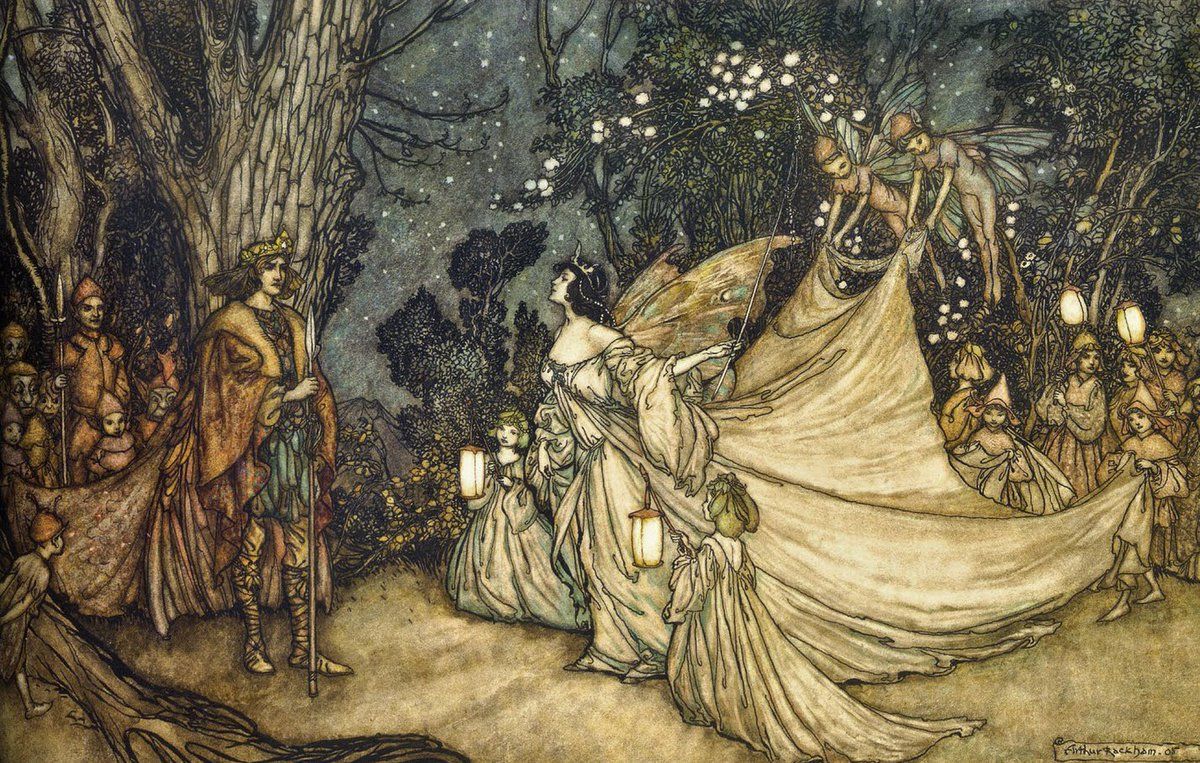
What comes next
We'll continue to learn more from the How to Teach Your Children Shakespeare book, but if/when it stops being engaging for her, we'll pause. There's no rush. There are enough lessons in this book to last us for years.
I recently tried having us watch the 1993 Kenneth Branagh version of Much Ado About Nothing, but Wanda didn't even last ten minutes. Argh! I'll try again in the future.
When we're a bit deeper into How to Teach..., I might have us try to watch the 1999 film version of A Midsummer Night's Dream, but I need to pre-watch it first to get a feel for whether she'll like it or not. I've searched high and low for a really good film or filmed stage production, and I haven't yet found one that people widely adore. If you have opinions, let me have 'em!
I've purchased the Folger Library edition of A Midsummer Night's Dream, because I loved all the Folger Library editions when I got into Shakespeare in high school, but now that I have it in hand I wonder if I might prefer the annotations from another publisher. If you have a favorite Shakespeare publisher, let me know!

